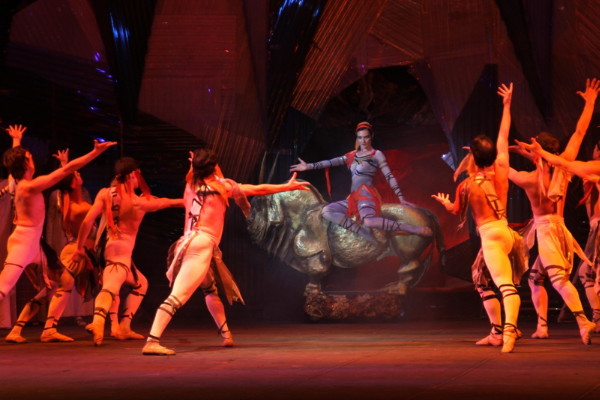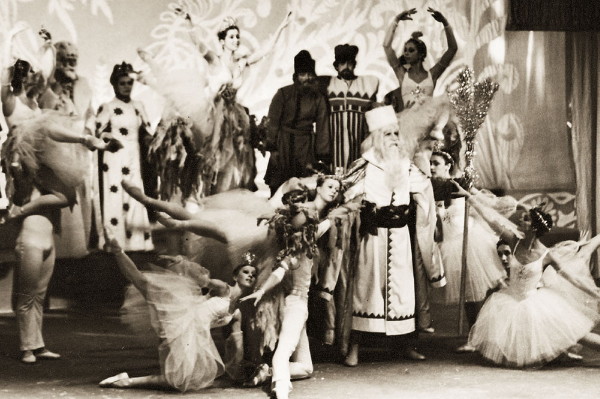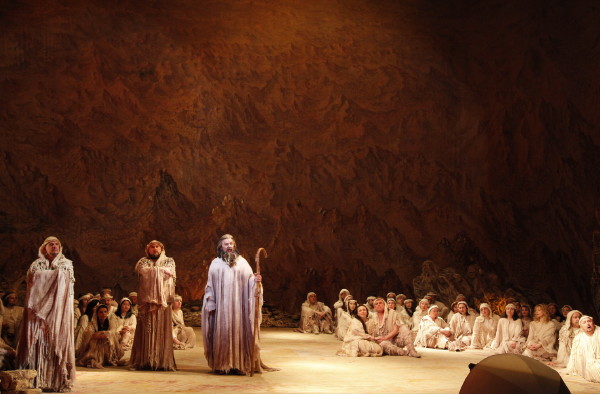Opera
Opera [опера]. The earliest operatic works by Ukrainian composers were written in the 18th century. Maksym Berezovsky’s Demofonte (1773) and Dmytro Bortniansky’s Creonte (1776), Alcides (1778), and Quinto Fabio (1779) were written to Italian librettos. Bortniansky also composed two French comic operas— Le Faucon (1786) and Le Fils rival (1787)—that were performed at the Russian imperial court in Saint Petersburg. Notable Ukrainian opera singers of the 18th century include Oleksii Rozumovsky, H. Holovnia, and Marko Poltoratsky.
Among the notable Ukrainian operas of the 19th century is Semen Hulak-Artemovsky’s Zaporozhian Cossack beyond the Danube, the music of which is strongly influenced by Ukrainian folk songs. This opera premiered in Saint Petersburg in 1863 with the composer himself performing the title role of Karas. Since then it has become one of the most popular Ukrainian operas and has been staged by theaters in Ukraine and in the diaspora. Its roles have been sung by some of the finest Ukrainian artists, including Mykola Sadovsky, Panas Saksahansky, Marko Kropyvnytsky, Ivan Patorzhynsky, Mykhailo Donets, Mariia Donets-Tesseir, Mariia Lytvynenko-Volgemut, Mariia Sadovska-Barilotti, and Mariia Zankovetska.
Other Ukrainian operas of the late 19th and early 20th centuries include Petro Sokalsky’s Mazepa, Obloha Dubna (The Siege of Dubno), and May Night; Mykola Arkas’s Kateryna (1890); Borys Pidhoretsky’s Kupal’na iskra (The Spark of Kupalo); Anatol Vakhnianyn’s Kupalo (1892); Denys Sichynsky’s Roksoliana (1909); and H. Kozachenko’s Pan sotnyk (The Noble Captain, 1902).
The most significant Ukrainian operatic works of this period were composed by Mykola Lysenko: Rizdviana nich (Christmas Night, 1882), Utoplena (The Drowned Maiden, 1884), Chornomortsi (The Black Sea Cossacks, 1872), the comic opera Eneïda (Aeneid, 1910), the chamber opera Nocturne (1912), the operetta Natalka Poltavka (Natalka from Poltava, 1889), and children's operas. Outstanding among Lysenko’s repertoire is the opera Taras Bulba (1891; based on Nikolai Gogol, libretto by Mykhailo Starytsky). It was premiered, after the composer’s death, in the Kharkiv State Opera (1924).
In the late 1920s, opera in Ukraine developed rapidly. This was partially because of the significant performing talent centered at the Kyiv, Kharkiv, and Odesa opera theaters (see Kyiv Theater of Opera and Ballet, Kharkiv Theater of Opera and Ballet, and Odesa Opera and Ballet Theater). Among the works staged were Volodymyr Femelidi’s Rozlom (The Schism), Oles Chyshko’s Iablunevyi polon (The Apple Tree Captivity), Borys Liatoshynsky’s Zolotyi obruch (The Golden Ring, 1929; based on Ivan Franko’s Zakhar Berkut), Valentyn Kostenko’s Karmeliuk, Pylyp Kozytsky’s Nevidomi soldaty (The Unknown Soldiers), and Mykhailo Verykivsky’s Captain and Naimychka (The Hired Girl, 1943). This growth did not last, however. With the Stalinist repression of Ukrainian culture, opera was forced to adhere to the principles of socialist realism. It was required that it appeal to a mass audience, reject the influences of Western European modernism, and become a medium for ideology and propaganda.
It was not until the 1960s that the Communist party’s ideological pressure somewhat abated. The relaxation led to the creation of a number of works of musical theater, characterized by an increased range of expression and a greater diversity in theme and genre. These operas include Yulii Meitus’s The Young Guard and Stolen Happiness, Vitalii Kyreiko’s The Forest Song, Kostiantyn Dankevych’s Nazar Stodolia, Heorhii Maiboroda’s Arsenal and Zahybel’ eskadry (The Destruction of the Squadron), Herman Zhukovsky’s The First Spring, and some more experimental ones by Ivan Karabyts, Vitalii Hubarenko, Yevhen Stankovych, and Volodymyr Zahortsev.
Ukraine has six major opera and ballet theaters: the Kyiv Theater of Opera and Ballet, Odesa Opera and Ballet Theater, Lviv Theater of Opera and Ballet, Kharkiv Theater of Opera and Ballet, Donetsk Opera and Ballet Theater, and Dnipropetrovsk Academic Opera and Ballet Theater. Important conductors of these opera theaters have been Volodymyr Piradov, K. Symeonov, Veniamin Tolba, Ya. Voshchak, Stepan Turchak, A. Pazovsky, S. Zak, Volodymyr Kolesnyk, Borys Chystiakov, Oleksander Klymov, Yurii Lutsiv, Mykola Malko, Mykola Pokrovsky, and others. The theaters have staged relatively few full-scale productions of Ukrainian operas, compared with those of Russian or European composers.
Acclaimed Ukrainian female opera singers of the 20th century included Yevheniia Miroshnychenko, Bela Rudenko, Oksana Petrusenko, Larysa Rudenko, Yelysaveta Chavdar, Zoia Haidai, Mariia Sokil, Yevheniia Zarytska, Ira Malaniuk, Carlotta Ordassy-Baransky, and Solomiia Krushelnytska, who premiered Giacomo Puccini’s Madame Butterfly in Italy in 1904. Notable Ukrainian male opera singers included Oleksander Myshuha, Yuliian Zakrzhevsky, Modest Menzinsky, Adam Didur, Ivan Kozlovsky, Borys Hmyria, Mykhailo Hryshko, Mykhailo Romensky, Pavlo Karmaliuk, Serhii Kozak, Yurii Kyporenko-Domansky, Vasyl Kozeratsky, Dmytro Hnatiuk, Myroslav Starytsky, and Anatolii Solovianenko.
Émigré Ukrainian composers of opera included Antin Rudnytsky (Dovbush and Anna Iaroslavna), Pavlo Pecheniha-Uhlytsky (The Witch), and Mykola Fomenko (Marusia Bohuslavka). The Canadian Ukrainian Opera Association (est 1974; see Lysenko Chorus) staged full and concert versions of Ukrainian operas in Canada and the United States.
BIBLIOGRAPHY
Iurmas, Ia. ‘Ukraïns'ka opera,’ Zhyttia i revoliutsiia, 1930, no. 5
Arkhimovych, L. Ukraïns'ka klasychna opera (Kyiv 1957)
Stanishevs’kyi, Iu. Opernyi teatr Radians'koï Ukraïny: Istoriia i suchasnist’ (Kyiv 1988)
Wasyl Wytwycky
[This article originally appeared in the Encyclopedia of Ukraine, vol. 3 (1993).]


